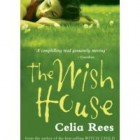Languid, dark and poetic, The Wish House is unlike any young adult novel Ive read recently. In fact, with its rich language and dark undercurrents it exhibits a similar aesthetic to Helen Dunmores'Talking to the Dead. Even the setting is similar: a blazing hot summer, so hot that the world seems to fade and feather a little, and a ramshackle manor beneath the roof of which all sorts of amoral curiosities appear to be playing out.
But unlike'Talking to the Dead, Rees novel is a coming of age story, that of Richards summer-time encounters with the bohemian Dalton family, and in particular with Clio, the daughter of brooding, eccentric artist JA Dalton. Its the early 1970s, and the divide between the Dalton family and Richards own couldnt be greaterwith his crossing the line between the two, of course, signalling his entry into adulthood. The Daltons are a local curiosity of sorts, with their rambling manor-house, their drug-taking and their free-love stance; in contrast, Richards family is almost crushingly pedestrian, all fishing trips and trashy novels read around a formica table.
When Richard steps into the Daltons world, hes transported, and theres a sense of his entering, in some way, a sort of fantasy realm. The dreamlike prose and disconnected tone of the narrators voice almost make it feel as though Richard is on some faerie path as he meets with the nymph-like Clio in the woods, is tempted by Clios witchy step-mother, and poses for the strange and reclusive Dalton. So entranced is Richard that hes almost unable to believe it when others speak unfavourably of their own interactions with the Daltons. Richard sees them in a way as his, and its in his gradual acceptance that this isnt the caseand perhaps that he shouldnt be wishing that this is the casethat we begin to see his character growth.
The Wish House'is a dark story, and theres a sense of dread and dissonance that runs through its pages; in a way it reminded me of the work of Margo Lanagan, whos noted for her eerie, suggestive writing. Theres something terribly disturbing about the dynamics of the Daltons, and theres more than a hint of incest and perhaps other unspoken abuses here. We get a hint of this when Clio and Richard begin to play a game of make-believe in the woods, and while Richard is growing too old for such things Clio, who is usually sexually aggressive and jaded in her worldliness seems to be utterly delighted by the innocence of the childhood game:
Clio had never played like this before and she took a deep delight in it. She had been to lots of places and had lived in a series of different communities, but she seemed to have spent most of her time with adultsIt seemed that he was living in a much younger time, rediscovering lost childhood delights
A large part of the creepy sense of the book is provided by the framing device, which is that of an art show Richard is attending some six years after this particular summer with the Daltons. We learn that the artist JA Dalton is now dead (its on page 5, so no spoiler complaints, please), and the tension between Richard and Clio hints that something has gone terribly wrong. This is further explored not just in the summer-time narrative, but in the series of catalogue descriptions that are spliced between the chapters, each detailing a piece of work by Clio or her father, and providing a grim counterpoint to the dreaminess of the rest of the narration.
Unfortunately, for all its beauty and depth, I did feel that the book suffered from a couple of flaws, the first being the bland character of Richard, who is really largely a lens for the fascinating, conflicted Daltonsand in particular the women in the family. The second is the ending, which I felt was somewhat of an anticlimax in both its relative prosaicness and its inevitability. Given the sheer looming sense of evil throughout the book, the revelation about Dalton and his relationship with his family (sorry, Im being deliberately vague here) feels almost reined in, as though forcing it to keep in line with YA sensibilities. But in all, this is a challenging, memorable read full of complex, contradictory characters, and it will certainly remain with me.
Rating: 



 (very good)
(very good)
Support Read in a Single Sitting by purchasing'The Wish House'using one of the affiliate links below:
Amazon'|'Book Depository UK'|'Book Depository USA'|'Booktopia
or support your'local independent.
Other books by Celia Rees:













Every time I read one of your reviews I think, Oooh I need to read that! And now my tbr is toppling and Im in the middle of three books. Le sigh.
This sounds wonderfully dark, which Ive been hankering for recently.
Every time? Even the ones where I rant and rave (I have one of those coming up)? ;)
This ones very short, if that helps! :)
OK. Not every time. But a lot. :)
Ha! :)
Mmmmmm, this does sound very fascinating. It sounds a smidgey bit like Donna Tartts The Secret History, one of my favorite books ever. I love a creepy family.
I thought This is Not Forgiveness to be an unusual yet engaging read, this sounds similar in tone. Hmm if I come across it I would certainly pick it up to try.
Great review as always Stephanie!